イベント&アクティビティ
Online DIJ Study Group on Generative AI and the Question of Authorship

Whether in Japan or elsewhere, the creation of books has never been an individual endeavor. The AI boom following the public release of ChatGPT in November 2022 sparked debates on the ethical use of generative tools and copyright issues. At the same time, however, it also prompted a reconsideration of the inherent fluidity of authorship as a concept in both arts and literature. This presentation examines how authorship is negotiated in contemporary Japanese literature in the context of AI. Focusing on several case studies it argues that each of them demonstrates how the notion of who (and what) can be an “author” has been gradually expanding over the past decades. Details and registration here
German Embassy and DFG Delegations visit the DIJ
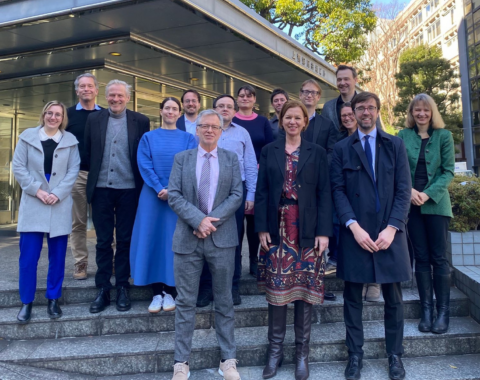 In January, delegations from the German Embassy in Tokyo (photo) and from the Deutsche Forschungsgemeinschaft (DFG) – German Research Foundation visited the DIJ. Headed by Ambassador Petra Sigmund, the German Embassy delegation, including Timotheus Felder-Roussety (Social Counselor) and Oliver Pieper (Head of the Research and Technology Division), visited our institute to learn about our research and outreach activities. After the presentation of our current research projects, we had an exciting discussion about the changing significance of Japan in the region, the role of China, Prime Minister Ishiba’s political agenda, digital transformation, and imaginations of the future. We also had a very fruitful exchange with the delegation from the DFG, including director Ingrid G. Krüßmann, Johanna Kowol-Santen, Aiko Sato, Saiki Hase, Gerrit Schlepper and Raoul Wagner. It was agreed to further intensify our scientific exchange and cooperation.
In January, delegations from the German Embassy in Tokyo (photo) and from the Deutsche Forschungsgemeinschaft (DFG) – German Research Foundation visited the DIJ. Headed by Ambassador Petra Sigmund, the German Embassy delegation, including Timotheus Felder-Roussety (Social Counselor) and Oliver Pieper (Head of the Research and Technology Division), visited our institute to learn about our research and outreach activities. After the presentation of our current research projects, we had an exciting discussion about the changing significance of Japan in the region, the role of China, Prime Minister Ishiba’s political agenda, digital transformation, and imaginations of the future. We also had a very fruitful exchange with the delegation from the DFG, including director Ingrid G. Krüßmann, Johanna Kowol-Santen, Aiko Sato, Saiki Hase, Gerrit Schlepper and Raoul Wagner. It was agreed to further intensify our scientific exchange and cooperation.
DIJ expertise in German TV and radio

DIJ deputy director Barbara Holthus and historian Torsten Weber have contributed their expertise to German TV and radio features. For the ZDF documentary “The truth about our pension” (in German), Barbara Holthus explains how Japanese society has adapted to having the world’s oldest population and the lessons that Germany may learn from Japan’s experience. Barbara was also interviewed for the Nippon Navigator podcast series on a broad range of issues, including work-life balance, social movements, pets, the Tokyo Olympics, and the upcoming Expo 2025. In the history podcast “John Rabe: ‘The good German of Nanjing'” (in German), broadcast by the German radio station WDR, Torsten Weber explains the role the German businessman John Rabe played in providing help to Chinese civilians during the Japanese-Chinese War and in documenting the Japanese atrocities in Nanjing in 1937/38.
Hybrid DIJ Forum on Sustainable Food Practices in Japan
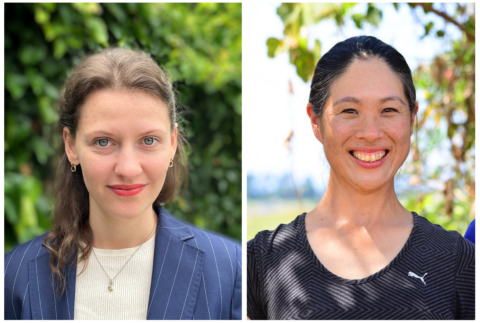 This DIJ Forum combines approaches to sustainable food practices of two different worlds within Japan. The urban landscape of Japanese cities—embodied in Shibuya’s bustling streets and iconic food vending machines—adopts an accelerated pace, catering to the fast schedules of modern Japanese life. Sustainability scholar Patricia Hein discusses Japanese approaches to food rhythms and uncovers how temporality influences sustainability practices through interviews with chefs, founders, vendors, and consumers. Farmer and local activist Eri Ōtsu shifts the focus to sustainable food production in rural Kumamoto. She illustrates the challenges and achievements of running an organic farm in rural Japan and demonstrates the possibilities of a sustainable lifestyle in Japan’s depopulating areas. Both speakers show how food is deeply tied to time, place, and seasonality in two different regions within the country. The event will be held in English, admission is free. The presentations will be followed by a Q&A session and a small reception. Details and registration here
This DIJ Forum combines approaches to sustainable food practices of two different worlds within Japan. The urban landscape of Japanese cities—embodied in Shibuya’s bustling streets and iconic food vending machines—adopts an accelerated pace, catering to the fast schedules of modern Japanese life. Sustainability scholar Patricia Hein discusses Japanese approaches to food rhythms and uncovers how temporality influences sustainability practices through interviews with chefs, founders, vendors, and consumers. Farmer and local activist Eri Ōtsu shifts the focus to sustainable food production in rural Kumamoto. She illustrates the challenges and achievements of running an organic farm in rural Japan and demonstrates the possibilities of a sustainable lifestyle in Japan’s depopulating areas. Both speakers show how food is deeply tied to time, place, and seasonality in two different regions within the country. The event will be held in English, admission is free. The presentations will be followed by a Q&A session and a small reception. Details and registration here
Eri Ōtsu, O2 Farm (Minamiaso, Kumamoto)
DIJ researchers at hybrid seminar ‘Japan and ASEAN in the Indo-Pacific’
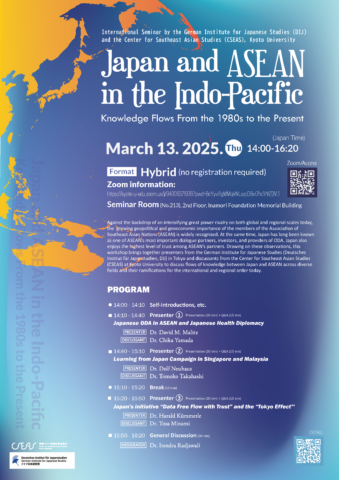 Against the backdrop of an intensifying great power rivalry on both global and regional scales today, the growing geopolitical and geoeconomic importance of the members of the Association of Southeast Asian Nations (ASEAN) is widely recognized. At the same time, Japan has long been known as one of ASEAN’s most important dialogue partners, investors, and providers of ODA. Japan also enjoys the highest level of trust among ASEAN’s partners. Drawing on these observations, this workshop brings together DIJ researchers David M. Malitz, Dolf-Alexander Neuhaus, and Harald Kuemmerle and scholars from the Center for Southeast Asian Studies at Kyoto University to discuss flows of knowledge between Japan and ASEAN across diverse fields and their ramifications for the international and regional order today. The hybrid event takes place on March 13, 2025 at Kyoto University and online. Details here
Against the backdrop of an intensifying great power rivalry on both global and regional scales today, the growing geopolitical and geoeconomic importance of the members of the Association of Southeast Asian Nations (ASEAN) is widely recognized. At the same time, Japan has long been known as one of ASEAN’s most important dialogue partners, investors, and providers of ODA. Japan also enjoys the highest level of trust among ASEAN’s partners. Drawing on these observations, this workshop brings together DIJ researchers David M. Malitz, Dolf-Alexander Neuhaus, and Harald Kuemmerle and scholars from the Center for Southeast Asian Studies at Kyoto University to discuss flows of knowledge between Japan and ASEAN across diverse fields and their ramifications for the international and regional order today. The hybrid event takes place on March 13, 2025 at Kyoto University and online. Details here
DIJ Newsletter Winter 2024/25
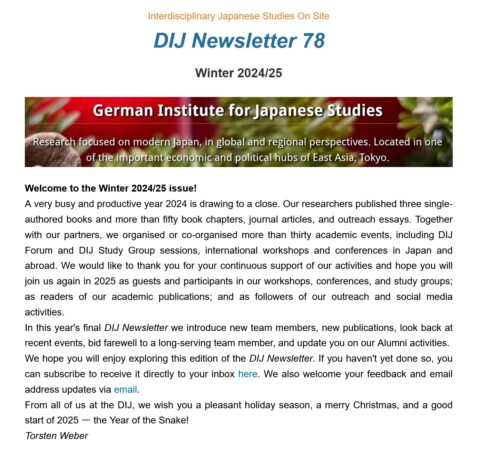 The winter issue of our DIJ Newsletter features updates on our research, publications, and events as well as news from the Institute, our team, and our alumni. We hope you will enjoy exploring this new edition of the DIJ Newsletter. If you haven’t done so yet, you can subscribe to receive our Newsletters directly to your inbox. The full issues and subscription form are available here.
The winter issue of our DIJ Newsletter features updates on our research, publications, and events as well as news from the Institute, our team, and our alumni. We hope you will enjoy exploring this new edition of the DIJ Newsletter. If you haven’t done so yet, you can subscribe to receive our Newsletters directly to your inbox. The full issues and subscription form are available here.
New book chapter by D.A. Neuhaus on Korea and the League of Nations
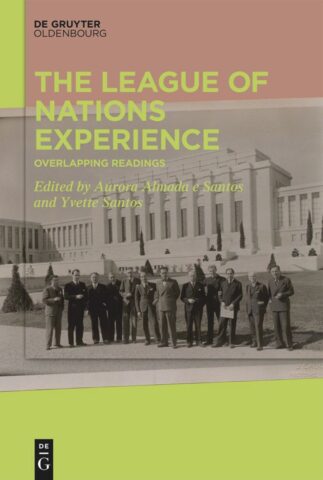
In his chapter “Korea and the League of Nations: from Versailles to the Manchurian Crisis, 1919–1933” Dolf-Alexander Neuhaus examines the relationship between the Korean independence movement and the League of Nations. The chapter elucidates the complex interactions between non-sovereign entities like Korea under Japanese rule and the international organization, offering insights into how Koreans and anti-Japanese nationalists perceived and engaged with the League of Nations during the interwar period. In 1919, when the League was established, Koreans were denied the right to self-govern. However, individuals and factions within the Provisional Government of the Republic of Korea still sought to utilize the League for their ends in the 1920s and early 1930s. By exploring these diplomatic and political dynamics, the chapter presents a nuanced picture of Korea’s struggle for recognition and national self-determination within the broader context of international politics. The chapter is published in The League of Nations Experience: Overlapping Readings (De Gruyter 2025).
New book chapter by Nicole M. Mueller studies reception of Thomas Mann in Japan

In her book chapter “Thomas Mann bei Mishima Yukio, Kita Morio und Tsuji Kunio: Verehrungspathos und Neuverortung als Vorbedingungen einer produktiven kulturüberschreitenden Rezeption” (in German), DIJ researcher Nicole M. Mueller sheds new light on the reception of Thomas Mann’s literary works by the Japanese authors Mishima Yukio, Kita Morio, and Tsuji Kunio. The idealization of Mann had been an essential element of Japan’s cultural modernization and westernization in the first decades of the 20th century, making him one of the larger-than-life figureheads of Japan’s prewar academic elite. Mishima and his contemporaries developed novel modes of reception based on a critical analysis of Mann’s work. Nicole’s chapter examines the extent to which Mishima’s, Kita’s, and Tsuji’s reception of Mann was conditioned by historical context and what characteristics make cross-cultural literary reception “productive”. The chapter is published in the edited volume Thomas Mann produktiv rezipiert. Zum Fortleben von Werk und Autor (Brill/Fink 2025).





 Open Access
Open Access
